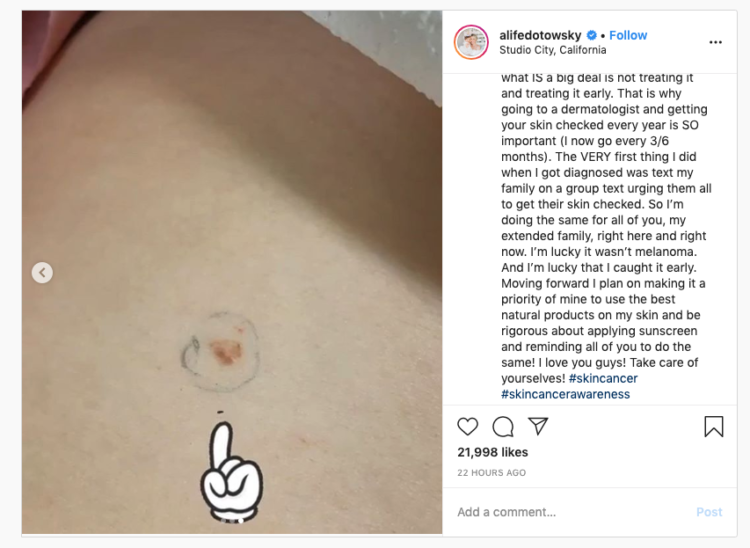Everyone Should See 'Bachelorette' Ali Fedotowsky's Photo of This Common Skin Cancer
One of the most critical aspects of skin cancer treatment is early detection. Former “Bachelor” and “Bachelorette” star Ali Fedotowsky-Manno opened up about her own skin cancer diagnosis to urge others to learn what skin cancer looks like and get checked frequently.
In an Instagram post on Thursday, Fedotowsky-Manno shared she was diagnosed with basal cell carcinoma (BCC). As she explained, basal cell carcinoma is rarely life-threatening, especially if caught early, but it can grow and spread if left untreated. According to the Skin Cancer Foundation, BCC most often occurs when DNA damage from exposure to ultraviolet (UV) radiation from the sun or indoor tanning triggers changes in basal cells in the outer layer of skin, resulting in uncontrolled growth.
Fedotowsky-Manno shared a photo of what her mole looked like before her biopsy, so people would know what to look for on their own skin. She wrote:
The VERY first thing I did when I got diagnosed was text my family on a group text urging them all to get their skin checked. So I’m doing the same for all of you, my extended family, right here and right now. I’m lucky it wasn’t melanoma. And I’m lucky that I caught it early. Moving forward I plan on making it a priority of mine to use the best natural products on my skin and be rigorous about applying sunscreen and reminding all of you to do the same!

She also included a picture of her stomach showing a scar from when she had skin that could have been cancerous removed six months ago. She said she now gets checked every three to six months.
“Needless to say, I’m never exposing my stomach to sun without sunscreen again!” she wrote.
Read Fedotowsky’s full post below:
Four million cases of BCC are diagnosed each year in the U.S. BCCs can look like open sores, red patches, pink growths, shiny bumps, scars or growths with slightly elevated, rolled edges and/or a central indentation, according to the Skin Cancer Foundation. In people with darker skin, the mole may also be brown in color.
Melanoma is a more rare and more dangerous form of skin cancer. It develops when damage from the sun or tanning beds triggers uncontrolled cellular growth in melanocytes, a type of skin cell that produces the pigment known as melanin. Melanoma is capable of spreading to other organs if left untreated. However, with early detection, the five-year survival rate is 98%.
Header image via Ali Fedotowsky’s Instagram

